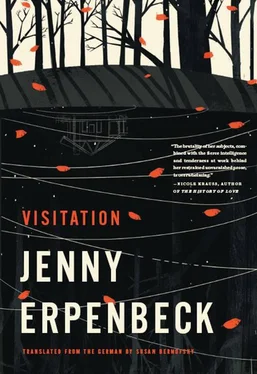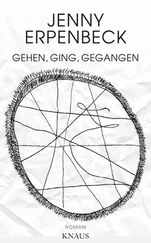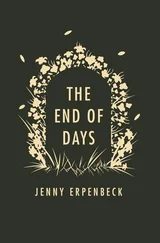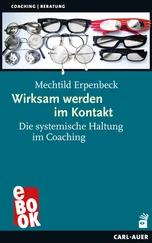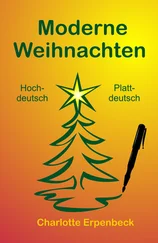And so the gardener fells several pine trees, saws them up and stacks the wood in the woodshed, he clears the roots and spreads a generous layer of topsoil over the Brandenburg sand, the gardener lays the path between the small and large meadows, and then extends it down the hill, eight times eight steps made of natural sandstone, he sows grass, plants the roses, plants shrubs to frame the small and large meadows, plants bushes on the slope, sets out hawthorn, walnut, Japanese cherry and blue spruce, as he digs he works his way through a thin layer of humus and then strikes bedrock that has to be broken up with the spade, for only beneath this is the layer of sand with the groundwater coursing through it, and finally beneath this sand is the blue clay that is found everywhere in this region. Once upon a time the waters of the lake washed over this rise that is called the Schäferberg or Shepherd’s Mountain by the locals, and thousands of years ago the Schäferberg was nothing but a shoal beneath the surface of the water, just as the Gurkenberg is today, or the Black Horn, the Keperling, the Hoffte, the Bulzenberg, the Nackliger, whose name means “naked man,” or Mindach’s Hill. The layer of sand beneath the bedrock that the gardener uncovers when he is digging his holes still displays a wave-like pattern, immortalizing the winds that blew across the water long ago. The gardener excavates the holes for the plants up to a depth of 80 centimeters and fills the bottom with composted soil so that the shrubs, bushes, Japanese cherry, hawthorn, blue spruce and walnut will flourish. Down beside the shore of the lake the gardener chops down five alder trees, clears the roots, braids green spruce twigs and places them in the boreholes so the black earth at the bottom will dry out. The gardener waters the roses, shrubs and young trees twice a day during the summer, once early in the morning and once at dusk, and he continues to water the bare soil of both meadows until the grass begins to sprout.
The gardener prunes all the bushes that overhang the stone perimeter in the fall, and prunes the forsythia and lilac the following spring as soon as they have blossomed. He removes the weeds from between the roses, prunes the roses, and has the farmers give him cattle dung that he uses to fertilize the hawthorn, walnut and Japanese cherry as well as the forsythia, lilac and rhododendron; he waters the roses and bushes twice a day during the summer, once early in the morning and once at dusk, on each of the meadows he places a sprinkler that bows to one side and then the other for half an hour twice a day, once early in the morning, and once when dusk is already beginning to gather, the gardener mows the grass once every two or three weeks. In fall, he saws the dry branches from the big trees with a long saw and smokes out the moles, in fall he rakes up the leaves from the meadows and burns them, when fall is coming to an end he empties all the water pipes in the house and shuts off the main valve, in winter he heats the house when the architect and his wife will be arriving and turns the water back on for the length of their stay.
HOW BITTER IT IS that he is having to bury everything. The porcelain from Meissen, his pewter pitchers and the silver. As if it were wartime. He himself doesn’t know whether he is burying something or simply laying in provisions for his return. He doesn’t even know if there’s any real difference between the two. In general he knows far less now than he used to. Just before the Russians marched in, his wife had packed up these very plates, these tankards and this silverware in crates, but that time she’d rowed out on the lake with the crates and lowered everything into the water on the shoal of the Nackliger which she knew from swimming. That was the place in the middle of the lake that was so shallow that when she was swimming far from shore in summer her feet would suddenly get tangled in the water plants and then she would start laughing and pretend to be drowning. The Russians, looking for what might have been hidden from them, only thought to poke around in the grass and the flowerbeds with long sticks, and while they were jabbing their sticks around, the lake was unhurriedly rinsing the dust from the treasures that were being kept safe from them. The new occupants of the house will have more time for swimming.
He’s lucky the winter is so mild this year, lucky that he’s able to get his spade into the earth at all. He buries his pewter pitchers among the roots of the big oak tree, the Meissen under a bushy fir, and the silver in the rose-bed right next to the house. Rest in peace. He knows that two hours from now he’ll be sitting in the S-Bahn to West Berlin, his fingernails still rimmed black with dirt. The architect fills up the holes, wondering whether pewter pitchers will now sprout from the buried pewter pitchers, plates and cups from the plates and cups, and forks, knives and spoons from the forks, knives and spoons, shooting up between the roses. He considers whether he shouldn’t finish up by burying the spade as well and use his bare hands to cover this final pit. And finds that he no longer knows something he once used to know: what counts as valuable and what does not. Will finding his Meissen porcelain again when he returns — if he returns — really make him any happier than finding this spade worth 2 marks 50 whose wooden handle has been polished smooth by the hands of the gardener over the past twenty years? But a wooden handle like this would be eaten by worms in any case. And so he doesn’t bury it, he brings it, as usual, back down to the toolshed beside the water, where for the past twenty years the spade has occupied its place among hoes, rakes, picks and shovels. Locks the toolshed, the golden spoon lure he once fished with dangling from the key, walks back up the shallow stone steps, hangs the key on the key hook in the living room, rinses his hands in the bathroom, two hours from now he’ll be sitting in the S-Bahn to West Berlin, his fingernails still rimmed black with dirt, he draws the crank for the shutters out of its niche in the wall one last time and closes the shutters from inside by means of the hidden mechanism he himself once thought up as a young man, to make his wife laugh.
He walks once more up the stairs, which creak at the second, seventh and second-to-last step, passing his wife’s room from which emanates, as always, the smell of peppermint and camphor; the way to his studio leads him through the crepuscular room lined with cabinets, he’d built a small window there, semicircular, shaded like an eye by the straw roof, it wasn’t long ago that a marten appeared to him at this window. The marten looked through the eye into the house just as he himself was looking out through the eye, animal and man both frozen there for a moment, and then the creature flitted away. The panes of frosted glass he’d had mounted in a frame of two times three panels in the door to his studio clink softly one last time as he approaches, he opens the door and enters, stands for a moment behind his drawing table and gazes down at the lake, the table is still covered with drawings for his first building in the Berlin city center, the most important commission in his life as an architect, the commission that has now caused his downfall. In the beams he hears the martens scrabbling. The martens are staying here.
He walks back down the stairs, on the way down they creak at the second, fifteenth and second-to-last step; he himself whittled grape leaves and clusters of their fruit on the finial at the bottom of the banister. Lock the door. In his trouser pocket the key is jingling that can open and close all the doors of the house including the apiary and woodshed, Zeiss Ikon, a key meeting the highest safety standards, quality German workmanship. Lock the door. And then crossing the living room, the light-colored slabs of sandstone beneath his footsteps in the entryway, fifty-by-fifty centimeters — the handle of the door to the vestibule made of brass, flat on top to sit well in the palm, edges grooved to offer traction to the thumb, when he depresses this handle it emits, as always, a faint metallic sigh — the slabs of sandstone beneath his footsteps in the entryway thirty-by-thirty centimeters; the birds on the door of the broom closet are flying, they’ve been flying there for a century, the flowers have been blossoming for a century, more grapes are hanging down, the Garden of Eden in twelve square chapters; he’d salvaged the door from an old farmhouse, its beauty makes you forget entirely about the scrub-brush, broom, bucket, dustpan and brush it conceals. Frame the view, that’s what he’s always thought, lead the eye. In the kitchen a faucet is dripping, shut it off. Look out through the bulls-eye panes at the sandy road and trees. The colored glass turns even the bare trees green, frame the view, it’s the first day of the new year, the gardener is still asleep, no one is out for a walk. Happy new year. In two hours he’ll be sitting in the S-Bahn to West Berlin.
Читать дальше
